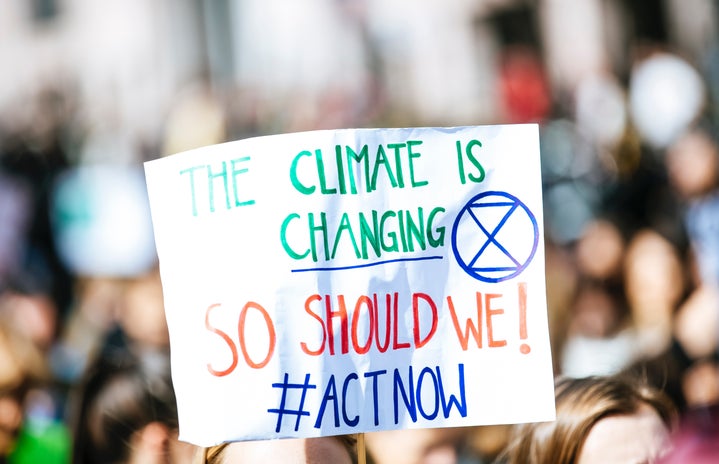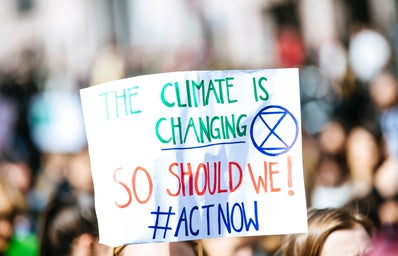For the past decade, Gen Z has been bombarded with the information that the Earth is heating up at an extremely fast rate, and we need to be the generation to fix it. We have been told that two degrees celsius of overall increase in the planet’s temperature could result in extreme weather events, droughts, and famine that could essentially end life as we know it. Not the most promising forecast for a generation to be growing with.With the recent events of Hurricane Ian destroying large parts of the caribbean (after not being fully rebuilt post-hurricane Maria) and large parts of the south west of my home state, Florida, I wanted to see where we are at with the doomsday prediction that has been looming over our heads since we were about five years old. I sat down with one of Bucknell’s professors who is passionate about this matter and asked her what we need to know for the next decade, what does politics have to do with it all, and if there is any promising news coming out of climate scientists research recently.
Before I started my interview with Professor Tanisha Williams, I wanted to have a better understanding of what I was going to be talking about. My deep dive into climate science led me to the conclusion that this topic of climate change is in fact not new. Rather, it has been a debate among politicians and the public since the early 90’s (Butler 2018). Dr. Tanisha Williams of the biology department at Bucknell knows this best – her work with pelargonium in South Africa utilized a long-term climate database to gather information about the flowering of this plant species. But why look at plants to talk about climate? Dr. Williams uses climate modeling to see whether or not plant species are able to adapt to the changing temperatures and environmental conditions. If they are able to change in response to the environment, that is a good sign that despite climate change the species may be okay. But more on that later.
When I sat down with Professor Tanisha Williams, I asked her about her overall path to Bucknell and how she ended up in the biology department as a postdoctoral fellow. After getting an undergraduate degree from Penn State, Dr. Williams pursued a PhD researching the plant species I previously mentioned. She then found her passion for the impact of climate change, leading her to Chris Martine – another professor in the biology department active in science communication, outreach, and of course, botany. Once I got some background about Professor Williams, I wanted to know the nitty-gritty about the state of the climate right now, and what we can expect to see in the near future.
To be frank, Dr. Williams said that the recent report by the IPCC (Intergovernmental Panel on Climate Change) was a “gut punch”. This looming one and half degrees celsius mark has been surpassed in some places and we are already starting to get a taste of its impact on weather, drought, crop growth. She continued on about how we’re not that far from the two degree mark, which is the “end-all be-all” limit, and the movement toward the two degree mark is something that we need to be conscious of. The recent events such as the extreme wildfires, hurricanes, droughts, etc. are just the beginning of what the rising temperature is going to look like. Not to say that everything is due to climate change, but if the recent weather events have shown us anything, it’s that we are not prepared to reach two degrees. Williams also made a point that climate change is such a complex issue that is not just related to the weather changing, but the systemic societal issues that underlie how climate change is going to affect our communities. Weather events, droughts, and other extreme catastrophic climate related issues are directly interconnected with racism, sexism, class status, etc. As Dr. Williams said, “If we start to fix climate change, all the other issues will start to be fixed as well.”
I then asked her about how politics and climate change were related, and what she would encourage young people, like myself, to do. She responded that the system of our society is a political system. There are laws and policies in place to protect the people, but also the environment. These policies do not mean anything if people of the community do not hold officials accountable for what they say. Williams said that she loves to see younger people at climate conventions, questioning the integrity of political officials. She wants to continue to see younger individuals being active in their communities, and educating themselves on the topic. Then I asked what younger individuals can actually do if they cannot get out to conventions or have the means to spread their word as much as they would like. She responded that things like recycling, no straws, and other highly viral sustainable trends only work if we all do them; an individual may not feel they are doing anything by walking to work instead of driving, but if everyone does it, then it actually is effective.
I finally asked her for any good news, and if there is anything promising for our future. Dr. Williams said that we have to “keep hope alive” and see that species, like the pelargonium, are adapting. They are responding to the changing climate. How fast they can do this may not be as fast as we would like, but THEY ARE ADAPTING. She also said that she loves that this problem is bringing people together. Scientists, naturalists, people that just like being outside, are coming together to make some change. I made a joke about humans– how the Earth will be fine, but humans, maybe not so much – to which she responded she thinks that is true. She thinks that the Earth is going to look a lot different, but it will still be here. Humans may not be, however, if we cannot figure out a way to change our lifestyles. We all need to come together as a community to fix this– we should’ve done it 30 years ago, but now is better than never.
Dr. Williams finished our conversation by saying: “live your life, don’t let this weigh you down, but be conscious of the life you are living.”
Sources
Butler CD. Climate Change, Health and Existential Risks to Civilization: A Comprehensive Review (1989⁻2013). Int J Environ Res Public Health. 2018 Oct 16;15(10):2266. doi: 10.3390/ijerph15102266. PMID: 30332777; PMCID: PMC6210172.
Dr. Tanisha Williams– Biology Department– Bucknell University


